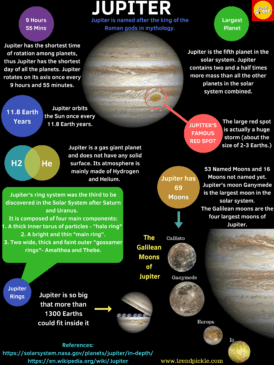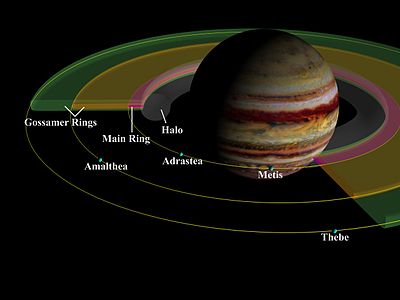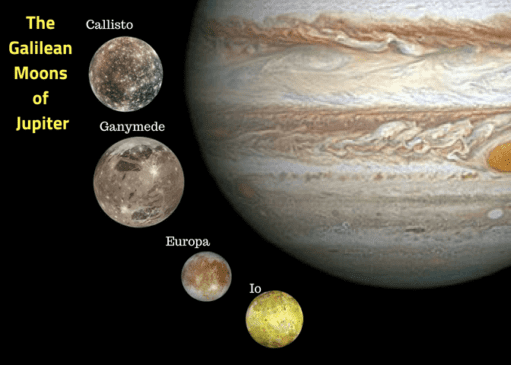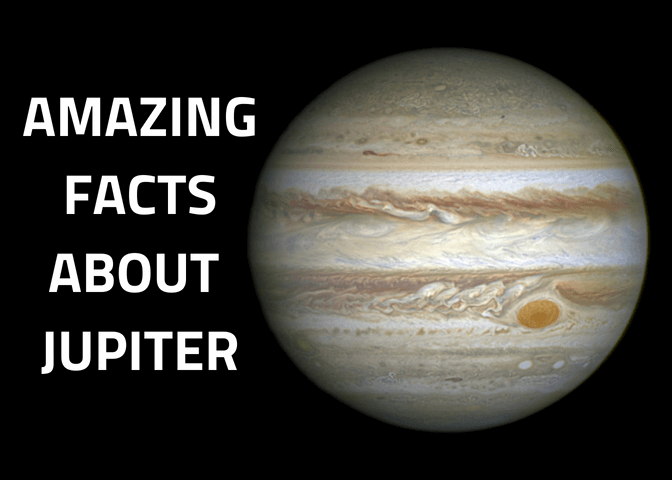The planet Jupiter is the fifth planet in the solar system. Jupiter is the largest planet in the solar system and contains two and a half times more mass than all the other planets in the solar system combined. It is made primarily of gases and is one of the gas giant planets. Here are some planet Jupiter facts.
What are some amazing facts about Jupiter?
1. Jupiter Can Be Seen By Naked Eyes
Jupiter is the fourth brightest object in the Solar system after Sun, Moon, and Venus. Jupiter is one of the five planets that can be seen with naked eye from Earth.
2. Jupiter Can Fit More Than 1300 Earths Inside It.
It is the largest planet of the solar system and has and the average diameter of Jupiter is approximately 88,846 miles or 142,984 km.
3. Jupiter is Named After a Roman God
It is named after the Roman God Jupiter, who is considered as the king of Gods in mythology due to its large size.
4. Jupiter Spins the Fastest Among All the Planets
Jupiter has the shortest time of rotation among planets, with a rotational velocity of 12.6 km/s. As a result it has the shortest day of all the planets. Jupiter rotates on its axis once every 9 hours and 55 minutes. The rotation is so fast that it flattens the planet slightly, giving it an oblate spheroid shape.
5. From Earth’s Point of View Jupiter Seems Slow
Jupiter completes one orbit around the Sun every 11.8 Earth years. The average distance between the Sun and Jupiter is about 483 million miles which is about 5.2 times the average distance between the Sun and Earth.
6. Jupiter Has a Large Red Spot
Jupiter is known for its large red spot which is actually a huge storm. The huge storm is so large that three Earths could fit inside it. This storm has been continuously observed for the last 188 years. The storm on Jupiter was first observed in 1665 by Giovanni Cassini and was later confirmed by Voyager 1 in 1979 during its journey to the planet. The red spot has existed for more than 350 years but seems to be shrinking in size. Astronomers are unsure if the storm will ever disappear completely but it is widely assumed that another such storm will appear somewhere else.

7. Jupiter Has Rings Around It
Jupiter has a ring system which was the third to be discovered in the Solar System, after Saturn and Uranus. It was first observed in 1979 by the Voyager 1 space probe. Jupiter’s ring system is composed of four main components:
- a thick inner torus of particles – “halo ring”
- A relatively bright and exceptionally thin “main ring”
- Two wide, thick and faint outer “gossamer rings” named – Amalthea and Thebe.
It is believed that these rings on Jupiter have been forged by material being ejected by its moons when meteorite impacts cause them to be hit. The main ring is generally believed to be made up of substances from the moons of Metis and Adrastea.

8. Jupiter is a Gas Planet
Jupiter’s atmosphere is mainly made up of Hydrogen and Helium and does not have any solid surface. Jupiter has the deepest atmosphere in the whole Solar System.
9. Jupiter Has a Total of 69 Moons
Out of the 69 moons, 53 have been officially named and 16 are yet to be named. According to astronomers, Jupiter is likely to have more than 200 natural satellites which were discovered by Pioneer 10 spacecraft in the year 1975. The Galilean moons are the four largest and prominent moons of Jupiter. They were first observed by Galileo Galilei in January 1610 and was thus named after him. The Galilean moons of Jupiter are Ganymede, Europa, Io, and Callisto. Ganymede is the largest moon in the Solar System and is larger than even planet Mercury with a diameter of around 5,268 km.

10. Jupiter Has a Very Strong Magnetic Field
The magnetic field on Jupiter is around 14 times stronger than the magnetic field of Earth and is the largest of all planets in the solar system. Such strong magnetic fields cause radio emissions from the polar regions of the planet. Astronomers think this magnetic field is due to the generation of eddy currents in the hydrogen core of the planet. These eddy currents along with the hydrogen ions present in Jupiter’s atmosphere, form a plasma plane in Jupiter’s equatorial plane.
11. Your Weight on Jupiter Will Be 2.5 Times the Weight on Earth
Jupiter has more than 317 times the mass of the Earth, providing its huge gravity. The Gravity on Jupiter is 24.79 m/s² which is about 2.5 times the Gravity of Earth.
12. On Jupiter Each Season Lasts for Around Three Years
Jupiter does not experience various seasons like other planets such as Earth and Mars. This is because the axis of Jupiter is tilted at only 3.13 degrees. Seasons change more slowly on Jupiter because of its distance from the sun and, duration of orbit around the Sun.
13. Nine Spacecrafts Have Visited Jupiter So Far
The first spacecraft to visit Jupiter was Pioneer 10 in 1973. Juno is the latest spacecraft to visit Jupiter. Juno entered the polar orbit of Jupiter on July 5, 2016, to begin a scientific investigation of the planet. There are also plans for future missions to focus on the Galilean moons of Jupiter and their possible subsurface oceans. In 2007 a probe New Horizon going towards Pluto flew by Jupiter for a gravity assist.
14. Jupiter’s Interior is Made of Rock, Metal, and Hydrogen Compounds
There are layers of compressed hydrogen gas, liquid metallic hydrogen, and a core of ice, rock, and metals below Jupiter’s massive atmosphere. The upper atmosphere of Jupiter is divided into cloud belts and zones.
15. Thickness of Jupiter’s Clouds is Only 50 km
Jupiter’s clouds are made up of ammonia crystals divided into two cloud levels. Below these clouds its pure helium and hydrogen.
16. Jupiter is Also Known as the Solar System’s Vacuum Cleaner
Astronomers believe Jupiter experiences at least 200 times more meteorite impacts than Earth because of its massive size and proximity to the Kuiper belt – an area beyond Neptune filled with asteroids and dwarf planets. Thanks to Jupiter a lot of asteroids that come close to Earth are cleared out.
References –
https://solarsystem.nasa.gov/planets/jupiter/in-depth/
https://en.wikipedia.org/wiki/Jupiter
This was our list of Planet Jupiter facts. If you would like to add any facts, please let us know in the comments section.

